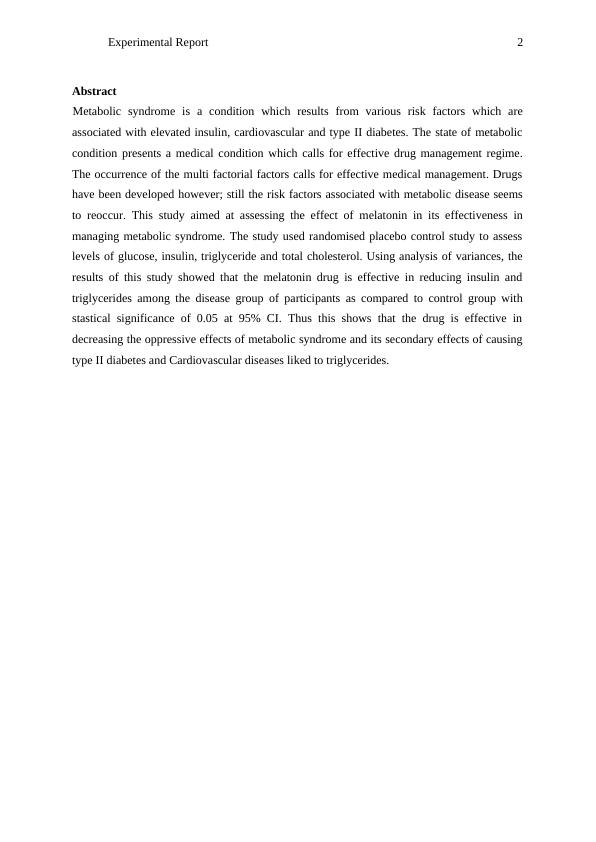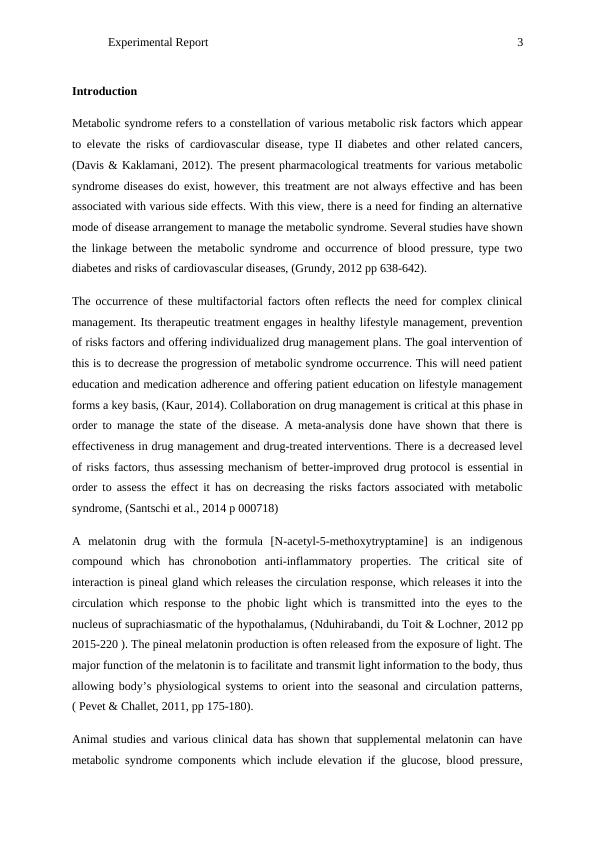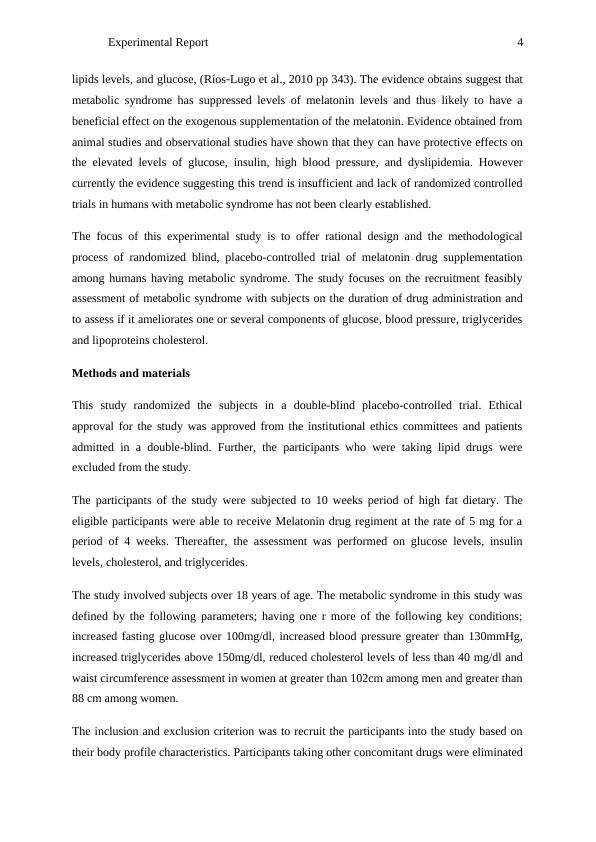Effect of Melatonin Drug on Metabolic Syndrome
Added on 2023-06-03
11 Pages2289 Words153 Views
To evaluate the effect of Melatonin drug on metabolic syndrome
Report
Students Name
University
Campus
Report
Students Name
University
Campus

Experimental Report 2
Abstract
Metabolic syndrome is a condition which results from various risk factors which are
associated with elevated insulin, cardiovascular and type II diabetes. The state of metabolic
condition presents a medical condition which calls for effective drug management regime.
The occurrence of the multi factorial factors calls for effective medical management. Drugs
have been developed however; still the risk factors associated with metabolic disease seems
to reoccur. This study aimed at assessing the effect of melatonin in its effectiveness in
managing metabolic syndrome. The study used randomised placebo control study to assess
levels of glucose, insulin, triglyceride and total cholesterol. Using analysis of variances, the
results of this study showed that the melatonin drug is effective in reducing insulin and
triglycerides among the disease group of participants as compared to control group with
stastical significance of 0.05 at 95% CI. Thus this shows that the drug is effective in
decreasing the oppressive effects of metabolic syndrome and its secondary effects of causing
type II diabetes and Cardiovascular diseases liked to triglycerides.
Abstract
Metabolic syndrome is a condition which results from various risk factors which are
associated with elevated insulin, cardiovascular and type II diabetes. The state of metabolic
condition presents a medical condition which calls for effective drug management regime.
The occurrence of the multi factorial factors calls for effective medical management. Drugs
have been developed however; still the risk factors associated with metabolic disease seems
to reoccur. This study aimed at assessing the effect of melatonin in its effectiveness in
managing metabolic syndrome. The study used randomised placebo control study to assess
levels of glucose, insulin, triglyceride and total cholesterol. Using analysis of variances, the
results of this study showed that the melatonin drug is effective in reducing insulin and
triglycerides among the disease group of participants as compared to control group with
stastical significance of 0.05 at 95% CI. Thus this shows that the drug is effective in
decreasing the oppressive effects of metabolic syndrome and its secondary effects of causing
type II diabetes and Cardiovascular diseases liked to triglycerides.

Experimental Report 3
Introduction
Metabolic syndrome refers to a constellation of various metabolic risk factors which appear
to elevate the risks of cardiovascular disease, type II diabetes and other related cancers,
(Davis & Kaklamani, 2012). The present pharmacological treatments for various metabolic
syndrome diseases do exist, however, this treatment are not always effective and has been
associated with various side effects. With this view, there is a need for finding an alternative
mode of disease arrangement to manage the metabolic syndrome. Several studies have shown
the linkage between the metabolic syndrome and occurrence of blood pressure, type two
diabetes and risks of cardiovascular diseases, (Grundy, 2012 pp 638-642).
The occurrence of these multifactorial factors often reflects the need for complex clinical
management. Its therapeutic treatment engages in healthy lifestyle management, prevention
of risks factors and offering individualized drug management plans. The goal intervention of
this is to decrease the progression of metabolic syndrome occurrence. This will need patient
education and medication adherence and offering patient education on lifestyle management
forms a key basis, (Kaur, 2014). Collaboration on drug management is critical at this phase in
order to manage the state of the disease. A meta-analysis done have shown that there is
effectiveness in drug management and drug-treated interventions. There is a decreased level
of risks factors, thus assessing mechanism of better-improved drug protocol is essential in
order to assess the effect it has on decreasing the risks factors associated with metabolic
syndrome, (Santschi et al., 2014 p 000718)
A melatonin drug with the formula [N-acetyl-5-methoxytryptamine] is an indigenous
compound which has chronobotion anti-inflammatory properties. The critical site of
interaction is pineal gland which releases the circulation response, which releases it into the
circulation which response to the phobic light which is transmitted into the eyes to the
nucleus of suprachiasmatic of the hypothalamus, (Nduhirabandi, du Toit & Lochner, 2012 pp
2015-220 ). The pineal melatonin production is often released from the exposure of light. The
major function of the melatonin is to facilitate and transmit light information to the body, thus
allowing body’s physiological systems to orient into the seasonal and circulation patterns,
( Pevet & Challet, 2011, pp 175-180).
Animal studies and various clinical data has shown that supplemental melatonin can have
metabolic syndrome components which include elevation if the glucose, blood pressure,
Introduction
Metabolic syndrome refers to a constellation of various metabolic risk factors which appear
to elevate the risks of cardiovascular disease, type II diabetes and other related cancers,
(Davis & Kaklamani, 2012). The present pharmacological treatments for various metabolic
syndrome diseases do exist, however, this treatment are not always effective and has been
associated with various side effects. With this view, there is a need for finding an alternative
mode of disease arrangement to manage the metabolic syndrome. Several studies have shown
the linkage between the metabolic syndrome and occurrence of blood pressure, type two
diabetes and risks of cardiovascular diseases, (Grundy, 2012 pp 638-642).
The occurrence of these multifactorial factors often reflects the need for complex clinical
management. Its therapeutic treatment engages in healthy lifestyle management, prevention
of risks factors and offering individualized drug management plans. The goal intervention of
this is to decrease the progression of metabolic syndrome occurrence. This will need patient
education and medication adherence and offering patient education on lifestyle management
forms a key basis, (Kaur, 2014). Collaboration on drug management is critical at this phase in
order to manage the state of the disease. A meta-analysis done have shown that there is
effectiveness in drug management and drug-treated interventions. There is a decreased level
of risks factors, thus assessing mechanism of better-improved drug protocol is essential in
order to assess the effect it has on decreasing the risks factors associated with metabolic
syndrome, (Santschi et al., 2014 p 000718)
A melatonin drug with the formula [N-acetyl-5-methoxytryptamine] is an indigenous
compound which has chronobotion anti-inflammatory properties. The critical site of
interaction is pineal gland which releases the circulation response, which releases it into the
circulation which response to the phobic light which is transmitted into the eyes to the
nucleus of suprachiasmatic of the hypothalamus, (Nduhirabandi, du Toit & Lochner, 2012 pp
2015-220 ). The pineal melatonin production is often released from the exposure of light. The
major function of the melatonin is to facilitate and transmit light information to the body, thus
allowing body’s physiological systems to orient into the seasonal and circulation patterns,
( Pevet & Challet, 2011, pp 175-180).
Animal studies and various clinical data has shown that supplemental melatonin can have
metabolic syndrome components which include elevation if the glucose, blood pressure,

Experimental Report 4
lipids levels, and glucose, (Ríos‐Lugo et al., 2010 pp 343). The evidence obtains suggest that
metabolic syndrome has suppressed levels of melatonin levels and thus likely to have a
beneficial effect on the exogenous supplementation of the melatonin. Evidence obtained from
animal studies and observational studies have shown that they can have protective effects on
the elevated levels of glucose, insulin, high blood pressure, and dyslipidemia. However
currently the evidence suggesting this trend is insufficient and lack of randomized controlled
trials in humans with metabolic syndrome has not been clearly established.
The focus of this experimental study is to offer rational design and the methodological
process of randomized blind, placebo-controlled trial of melatonin drug supplementation
among humans having metabolic syndrome. The study focuses on the recruitment feasibly
assessment of metabolic syndrome with subjects on the duration of drug administration and
to assess if it ameliorates one or several components of glucose, blood pressure, triglycerides
and lipoproteins cholesterol.
Methods and materials
This study randomized the subjects in a double-blind placebo-controlled trial. Ethical
approval for the study was approved from the institutional ethics committees and patients
admitted in a double-blind. Further, the participants who were taking lipid drugs were
excluded from the study.
The participants of the study were subjected to 10 weeks period of high fat dietary. The
eligible participants were able to receive Melatonin drug regiment at the rate of 5 mg for a
period of 4 weeks. Thereafter, the assessment was performed on glucose levels, insulin
levels, cholesterol, and triglycerides.
The study involved subjects over 18 years of age. The metabolic syndrome in this study was
defined by the following parameters; having one r more of the following key conditions;
increased fasting glucose over 100mg/dl, increased blood pressure greater than 130mmHg,
increased triglycerides above 150mg/dl, reduced cholesterol levels of less than 40 mg/dl and
waist circumference assessment in women at greater than 102cm among men and greater than
88 cm among women.
The inclusion and exclusion criterion was to recruit the participants into the study based on
their body profile characteristics. Participants taking other concomitant drugs were eliminated
lipids levels, and glucose, (Ríos‐Lugo et al., 2010 pp 343). The evidence obtains suggest that
metabolic syndrome has suppressed levels of melatonin levels and thus likely to have a
beneficial effect on the exogenous supplementation of the melatonin. Evidence obtained from
animal studies and observational studies have shown that they can have protective effects on
the elevated levels of glucose, insulin, high blood pressure, and dyslipidemia. However
currently the evidence suggesting this trend is insufficient and lack of randomized controlled
trials in humans with metabolic syndrome has not been clearly established.
The focus of this experimental study is to offer rational design and the methodological
process of randomized blind, placebo-controlled trial of melatonin drug supplementation
among humans having metabolic syndrome. The study focuses on the recruitment feasibly
assessment of metabolic syndrome with subjects on the duration of drug administration and
to assess if it ameliorates one or several components of glucose, blood pressure, triglycerides
and lipoproteins cholesterol.
Methods and materials
This study randomized the subjects in a double-blind placebo-controlled trial. Ethical
approval for the study was approved from the institutional ethics committees and patients
admitted in a double-blind. Further, the participants who were taking lipid drugs were
excluded from the study.
The participants of the study were subjected to 10 weeks period of high fat dietary. The
eligible participants were able to receive Melatonin drug regiment at the rate of 5 mg for a
period of 4 weeks. Thereafter, the assessment was performed on glucose levels, insulin
levels, cholesterol, and triglycerides.
The study involved subjects over 18 years of age. The metabolic syndrome in this study was
defined by the following parameters; having one r more of the following key conditions;
increased fasting glucose over 100mg/dl, increased blood pressure greater than 130mmHg,
increased triglycerides above 150mg/dl, reduced cholesterol levels of less than 40 mg/dl and
waist circumference assessment in women at greater than 102cm among men and greater than
88 cm among women.
The inclusion and exclusion criterion was to recruit the participants into the study based on
their body profile characteristics. Participants taking other concomitant drugs were eliminated

End of preview
Want to access all the pages? Upload your documents or become a member.
Related Documents
Effect of Statin Recombinant Drug on Metabolic Syndromelg...
|8
|2190
|172
Use of New Drug X in the Treatment of Metabolic Syndromelg...
|11
|2241
|52
Clinical Reasoning Tool Application in Nursing: Addressing Patient Bacci's Medical Assessment and Wound Carelg...
|11
|3059
|489
Metabolic syndrome Pharmacology Report 2022lg...
|8
|2383
|33
Understanding Type II Diabetes: Symptoms, Treatment and Preventionlg...
|9
|2805
|325
Type 2 Diabetes: Symptoms, Health Problems, and Medical Treatmentslg...
|4
|2737
|461
